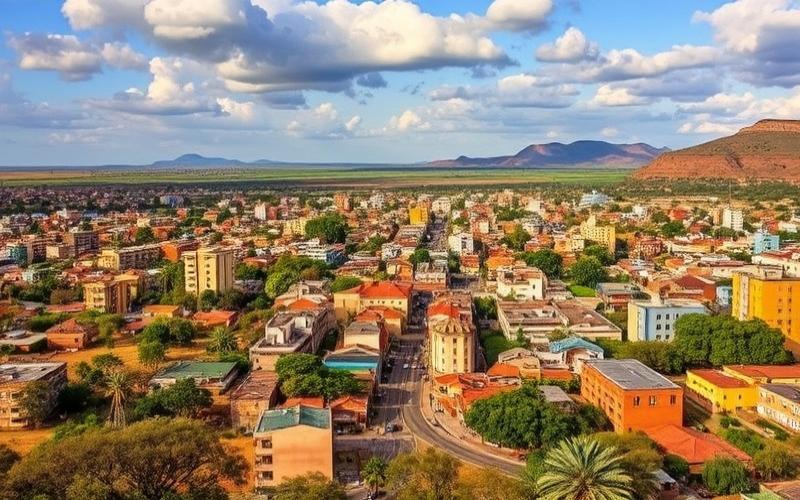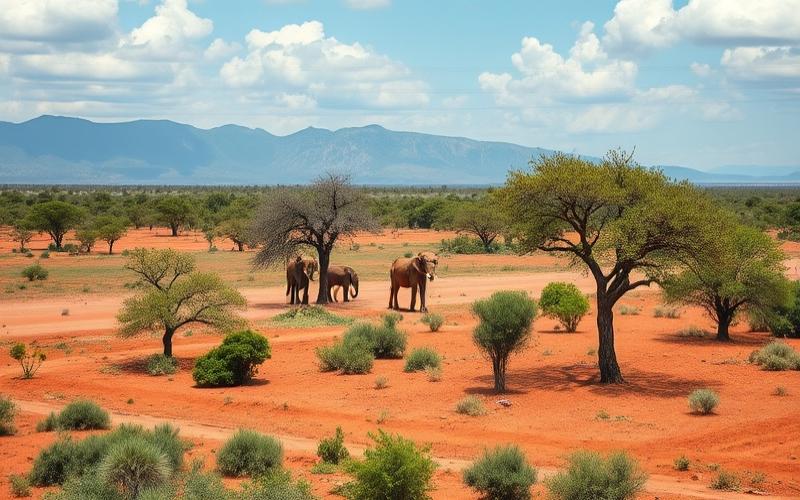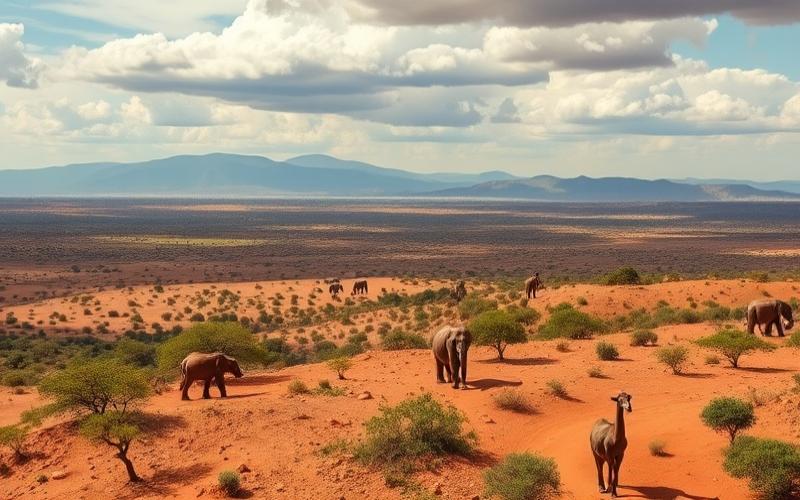
 Published on and written by Cyril Jarnias
Published on and written by Cyril Jarnias
South Africa, often regarded as the most industrialized nation on the African continent, offers numerous opportunities for investors looking to explore dynamic emerging markets. With a diversified economy and a business-friendly regulatory framework, sectors such as renewable energy, telecommunications, and agribusiness demonstrate remarkable growth potential.
Recent policy developments and economic reforms aim to foster a more stable investment environment, enabling key industries to thrive. This article examines the most promising sectors for investors in South Africa, highlighting strategic opportunities and challenges within this evolving economic landscape.
Overview of South Africa’s Economy
| Key Indicator | Value/Estimate 2024-2025 |
|---|---|
| GDP (2024) | $400.26 billion USD |
| GDP Forecast (End 2025) | $387.55 billion USD |
| GDP Growth (2025) | 0.8% to 1.0% |
| Inflation (2024) | 4.4% |
| Inflation (2025, projected) | 3.8% |
| Unemployment Rate (Q1 2025) | 32.9% |
| Youth Unemployment Rate | 46.1% |
| Public Debt (2025) | > 75% of GDP |
Main Contributing Sectors
- Mining Sector: South Africa remains a global leader in gold, platinum, chrome, and manganese production. This sector remains strategic despite its relative decline in GDP structure.
- Agriculture: After difficult years, agriculture has rebounded, particularly in Q1 2025 (+15.8%), contributing positively to quarterly growth.
- Financial Services: The banking and financial sector is one of the most sophisticated on the African continent, playing a key role in macroeconomic stability.
- Tourism: An important sector for employment and foreign currency, South African tourism has seen a gradual recovery but remains sensitive to security and health contexts.
Labor Market Structure
- Structurally high unemployment, particularly affecting youth and urban areas.
- Significant informal sector, absorbing a substantial portion of the workforce.
- Marked regional and sectoral disparities, with strong contrasts between major cities and rural areas.
Current Economic Challenges
- Income inequality: South Africa has one of the highest Gini coefficients in the world, illustrating significant gaps between rich and poor.
- Necessary structural reforms:
- Reforms in energy (particularly to resolve electricity crises).
- Modernization of logistics infrastructure (ports, rail, roads).
- Improvement of governance and fight against corruption.
- Transformation of the labor market to reduce unemployment and youth exclusion.
- Government initiatives:
- Launch of the second phase of Operation Vulindlela with 30 priority reforms (energy, logistics, water, digital, communities).
- Tax incentives and creation of special economic zones to attract foreign investment.
- Social inclusion policies and support for local entrepreneurship.
Trade Relations and Regional Integration
- Main trading partners: China, European Union, United States, India, Japan.
- Regional and international role:
- Key member of the Southern African Development Community (SADC), facilitating economic integration and regional trade.
- Member of BRICS (with Brazil, Russia, India, China), offering investment opportunities and access to new markets while strengthening its diplomatic and economic weight globally.
Key takeaway: Despite significant economic potential and a diversified productive structure, South Africa faces major structural challenges. The government is banking on targeted reforms and international cooperation to support growth, reduce inequalities, and strengthen the resilience of its economy.
Good to know:
South Africa’s GDP is around $400 billion USD, with a projected growth rate of 3% for 2023, despite a 35% unemployment rate; the mining sector, financial services, and tourism remain key pillars, while the country works to reduce inequalities through reforms and develops its trade links within SADC and BRICS.
Promising Sectors for Investors
Growing Economic Sectors in South Africa
| Sector | Share of GDP (2024-2025) | Recent Trend | Recent Investments | Key Opportunities | Main Challenges |
|---|---|---|---|---|---|
| Renewable Energy | 4% (electricity/gas/water) | Growth post-energy crisis, recent slowdown in independent projects | Major foreign investments, e.g., Redstone CSP ($900M USD), ENEL Green Power (over 1 GW installed) | Strong solar/wind potential, improving regulatory framework | Political uncertainty, logistical bottlenecks, funding |
| Technology & Innovation | N/A (financial services: 23%) | Sustained growth of fintechs and startups, Johannesburg and Cape Town as hubs | Notable funding rounds for Yoco ($83M USD, 2021), TymeBank ($110M USD, 2023) | Expanding digital market, public support for innovation | Access to finance, digital skills shortage |
| Tourism | Trade/hospitality: 14% | Post-Covid recovery, but slowed growth in 2024 | Revival of hotel investments and tourism infrastructure | Biodiversity, national parks, business tourism | Security, energy crisis, aging infrastructure |
| Mining Industry | Extraction: 7% | Gradual revival, mining cadastre reform in 2025 | Investments in local processing, e.g., Rio Tinto (aluminum smelter), Anglo American (PGMs) | Mineral wealth (platinum, gold, lithium), incentives for local processing | Regulatory instability, energy cost, logistics |
| Agriculture & Agribusiness | 3% | Growth of +15.8% Q1 2025 (climate rebound effect) | Development of agribusiness, investments in irrigation and exports | Fruit exports (citrus, grapes), favorable climate | Climate variability (El Niño), logistics infrastructure |
Statistics and Recent Investments
- In 2024, foreign investments in renewable energy exceeded $2 billion USD, with several major solar and wind projects completed or underway.
- The technology sector attracts over $300 million USD in venture capital annually since 2022, driven by fintechs and e-commerce growth.
- Agriculture contributed +0.4 percentage points to GDP growth in Q1 2025, thanks to favorable weather conditions.
- Tourism significantly contributes to the balance of payments, with a strong recovery in foreign visitors in 2024.
Tax Benefits and Support Programs
- Special Economic Zones (SEZ) with partial tax exemptions, incentives for industrial investment, and facilitated access to infrastructure.
- Tax deductions for investments in renewable energy and technology R&D.
- Government support programs for agriculture (irrigation subsidies, export support) and mining processing (incentives for local value addition).
- Support for innovation via the Department of Science and Innovation, and seed funding for tech startups.
Examples of Recent Successes
- Redstone Solar Thermal Power Plant (Northern Cape): $900M USD solar project, one of the largest in Africa.
- TymeBank (South African fintech): raised over $200M USD since 2022, expanding into Asia.
- Citrus exports: record in 2024, with South Africa consolidating its position as top global exporter of stone fruits to the EU and China.
- Mining processing: Rio Tinto and Anglo American investing in local processing of platinum and aluminum.
Challenges to Anticipate
- Logistical constraints (ports, rail) and recurring power outages.
- Regulatory instability, particularly in the mining sector.
- Tax incentives sometimes considered complex and regional disparities in access to support.
- Climate variability affecting agriculture.
- Security and political uncertainty potentially hindering investments.
Unique Opportunities
- Growth potential of the domestic market (60 million inhabitants, expanding middle class).
- Strategic position for exporting to Southern Africa.
- Regional leadership in finance, tech, and green energy.
- Abundant natural resources and relatively developed basic infrastructure compared to the region.
South Africa, despite structural challenges, remains a major market for international investors in renewable energy, technology, agribusiness, and mining processing, with attractive tax incentives and recent examples of success.
Good to know:
South Africa offers attractive tax benefits for investments in renewable energy and technology, with notable successes like the Nojoli wind farm; however, investors must navigate regulatory challenges and growing energy capacity issues to maximize growth potential.
European Investments in South Africa: Opportunities and Challenges
South African economic sectors particularly attractive to European investors are:
- Renewable Energy: massive investments in green hydrogen, solar, and wind, supported by strategic partnerships such as the Global Gateway program and the Just Energy Transition Partnership (JETP).
- Information and Communication Technologies (ICT): development of digital networks (fiber optics, 5G), digital logistics corridors, modernization of port and rail infrastructure.
- Agribusiness: opportunities in agricultural processing, local supply chains, food diversification.
| Sector | Main Opportunities |
|---|---|
| Renewable Energy | Green hydrogen, solar, wind; energy transition |
| ICT | 5G/fiber optic networks; logistics digitalization |
| Agribusiness | Food processing; strengthening local chains |
| Health/Pharmaceuticals | Local vaccine production; regulatory strengthening |
Economic Reforms Implemented by the South African Government
- Simplification of the regulatory framework concerning foreign investments.
- Tax incentives for green and technological projects.
- Strengthening of the legal framework around intellectual property and investor protection.
- Modernization of the labor code aimed at facilitating hiring of qualified local staff.
Existing Strategic Partnerships or Trade Agreements
- EU-South Africa Global Gateway Agreement (2025) focusing on clean energy, digital/logistics connectivity, and health
- JETP Partnership signed at COP26 on massive funding for transition away from coal
- Ongoing negotiations on a “new generation” EU-South Africa trade agreement focused on strategic industries
- Collaboration between EIB/Southern African Bank on investment dedicated to renewable energy
Major Challenges Faced by European Investors
- Political volatility: frequent political changes potentially impacting regulatory continuity or fiscal stability
- Security issues: high crime in certain urban/industrial regions; necessity to invest in private security
- Administrative/regulatory complexity: lengthy procedures for obtaining licenses/investments; constant adaptation to reforms
Practical Illustrations – Recent Successes or Failures
- Success: The Global Gateway plan (€4.7 billion) launched in 2025 enabled rapid funding of solar/green hydrogen installations as well as strengthening local pharmaceutical industry—with immediate positive effect on skilled employment and technology transfer.
- Success: European investment via EIB/Southern African Bank enabled construction/modernization of major solar plants with integration into the national grid.
- Partial failure: US withdrawal from JETP in late 2024 weakened some mixed funding initially planned with European partners; temporary slowdown observed in some energy projects due to lack of stable tripartite agreement.
To invest effectively in South Africa today:
The opportunities offered by a diversified economy are always accompanied by persistent structural challenges that require rigorous legal anticipation and constant strategic adaptation.
Good to know:
South African sectors like renewable energy, ICT, and agribusiness attract European investments, supported by the government’s economic reforms, but these opportunities are often hampered by political volatility and regulatory complexity; for example, a solar power plant project in partnership with France recently encountered delays due to these challenges.
Disclaimer: The information provided on this website is for informational purposes only and does not constitute financial, legal, or professional advice. We encourage you to consult qualified experts before making any investment, real estate, or expatriation decisions. Although we strive to maintain up-to-date and accurate information, we do not guarantee the completeness, accuracy, or timeliness of the proposed content. As investment and expatriation involve risks, we disclaim any liability for potential losses or damages arising from the use of this site. Your use of this site confirms your acceptance of these terms and your understanding of the associated risks.
























































